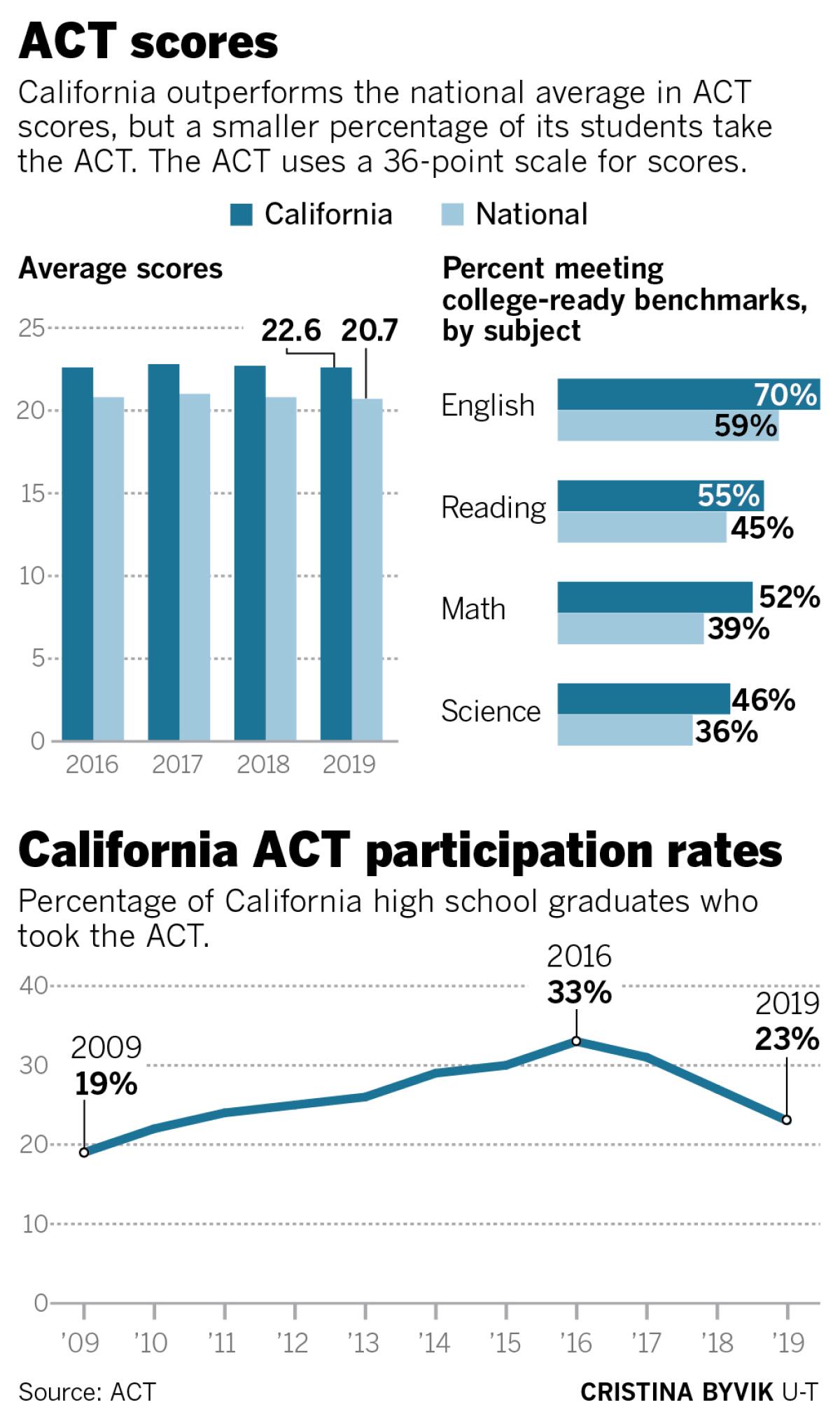California’s ACT participation rate falls to lowest point in nearly a decade
About 37% of California test-takers met all college readiness benchmarks on the ACT
The percentage of California students who take the ACT fell to its lowest point in nine years, while the average ACT score for California graduates remains virtually unchanged from four years ago, according to newly released results from the standardized test often used for college admissions.
About 37% of California’s Class of 2019 who took the ACT were deemed “college-ready” in all four subjects tested, the same percentage as four years ago.
That’s better than the national average. About a quarter of 2019 graduates nationwide who took the ACT tested college-ready in all subjects, and the shares of U.S. graduates who tested college-ready in math and English were the lowest in 15 years, according to the ACT.
California’s average composite score for the ACT is 22.6, out of 36 possible points. That’s higher than the national average of 20.7.
Meanwhile, California’s ACT participation rate has declined for the past three years. About 23% of California’s 2019 graduating class took the ACT, compared to about 30% of its 2015 graduating class.

The national participation rate also has been in decline. About 52% of U.S. students took the test this year, down from 59% four years ago.
More California students take the SAT, which is administered by the College Board. About 431,000 students in the class of 2019, or 63% of the class, took the SAT.
The ACT results were released this week as some were calling for California’s public universities to stop requiring the ACT or SAT for college admission.
Lawyers representing the Compton Unified School District, as well as three students and five nonprofits, threatened this week to sue the University of California if the system doesn’t stop requiring SAT and ACT scores in admissions decisions.
Critics of the standardized tests say test performance is closely correlated with — and therefore likely influenced by — family incomes, parent education levels and race. They argue that using the tests for college admissions discriminates against disadvantaged students, including students of color, poor students and students with disabilities.
“The SAT has built-in biases that ultimately derail the college aspirations of thousands of hardworking students of color who would thrive in college and make important contributions to the UC community and beyond,” said Lisa Holder of the Equal Justice Society in a statement. “The test serves no purpose other than to act as a barrier to higher education for historically disadvantaged students.”
Both the ACT and College Board said their tests are not discriminatory. They said the tests merely reflect inequities already pervading other aspects of education.
“ACT test results reflect inequities in access and quality of education, shining a light on where they exist,” the ACT said. “Blaming standardized tests for differences in educational quality and opportunities that exist will not improve educational outcomes.”
The College Board said in a statement, “Any objective measure of student achievement will shine a light on inequalities in our education system. Our focus, with our members and partners, is combating these longstanding inequalities.”
The ACT and College Board say they have taken steps to make tests more accessible. Both provide fee waivers for low-income students and free test-prep materials.
Both organizations also said they have designed their test questions to not be biased against certain student groups.
The testing organizations said they believe performance on their tests is predictive of student success in college and that having more factors to consider helps better inform college admission decisions.
Taketa writes for the San Diego Union-Tribune.
More to Read
Sign up for Essential California
The most important California stories and recommendations in your inbox every morning.
You may occasionally receive promotional content from the Los Angeles Times.











